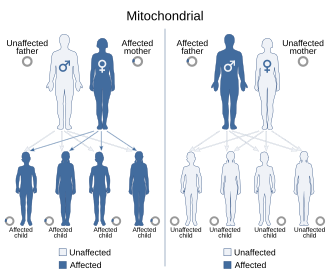Mitochondrial myopathy
(Redirected from Mitochondrial myopathies)
Editor-In-Chief: Prab R Tumpati, MD
Obesity, Sleep & Internal medicine
Founder, WikiMD Wellnesspedia &
W8MD medical weight loss NYC and sleep center NYC
| Mitochondrial myopathy | |
|---|---|

| |
| Synonyms | |
| Pronounce | |
| Specialty | Neurology, Genetics |
| Symptoms | Muscle weakness, Exercise intolerance, Fatigue (medical), Hearing loss, Cardiomyopathy |
| Complications | N/A |
| Onset | Varies, often in childhood or adolescence |
| Duration | Long-term |
| Types | N/A |
| Causes | Mutations in mitochondrial DNA or nuclear DNA affecting mitochondrial function |
| Risks | |
| Diagnosis | Muscle biopsy, Genetic testing, Blood tests |
| Differential diagnosis | Muscular dystrophy, Metabolic myopathy |
| Prevention | N/A |
| Treatment | Supportive care, Physical therapy, Coenzyme Q10 supplementation |
| Medication | |
| Prognosis | Variable, depends on specific mutation and severity |
| Frequency | Rare |
| Deaths | |
Mitochondrial myopathy is a type of myopathy associated with mitochondrial disease. It is a neuromuscular disease characterized by muscle weakness, exercise intolerance, and fatigue. It is caused by genetic mutations that affect the function of the mitochondria, the energy-producing structures within cells.
Symptoms
The symptoms of mitochondrial myopathy can vary greatly from person to person. They may include muscle weakness, fatigue, exercise intolerance, and difficulty with physical coordination. Some people may also experience heart problems, diabetes, and gastrointestinal disorders. In severe cases, the disease can lead to life-threatening complications such as heart failure and respiratory failure.
Causes
Mitochondrial myopathy is caused by genetic mutations that affect the function of the mitochondria. These mutations can be inherited from one or both parents, or they can occur spontaneously. The mutations cause the mitochondria to produce less energy than normal, which can lead to muscle weakness and other symptoms.
Diagnosis
The diagnosis of mitochondrial myopathy is often challenging due to the wide range of symptoms and the fact that many other conditions can cause similar symptoms. Doctors may use a combination of medical history, physical examination, and laboratory tests to diagnose the condition. These tests may include blood tests, muscle biopsy, and genetic testing.
Treatment
There is currently no cure for mitochondrial myopathy, but treatment can help manage symptoms and improve quality of life. Treatment options may include physical therapy, medication, and in some cases, surgery. Lifestyle changes such as regular exercise and a healthy diet can also help manage symptoms.
See also
Transform your life with W8MD's budget GLP-1 injections from $125.
W8MD offers a medical weight loss program to lose weight in Philadelphia. Our physician-supervised medical weight loss provides:
- Most insurances accepted or discounted self-pay rates. We will obtain insurance prior authorizations if needed.
- Generic GLP1 weight loss injections from $125 for the starting dose.
- Also offer prescription weight loss medications including Phentermine, Qsymia, Diethylpropion, Contrave etc.
NYC weight loss doctor appointments
Start your NYC weight loss journey today at our NYC medical weight loss and Philadelphia medical weight loss clinics.
- Call 718-946-5500 to lose weight in NYC or for medical weight loss in Philadelphia 215-676-2334.
- Tags:NYC medical weight loss, Philadelphia lose weight Zepbound NYC, Budget GLP1 weight loss injections, Wegovy Philadelphia, Wegovy NYC, Philadelphia medical weight loss, Brookly weight loss and Wegovy NYC
|
WikiMD's Wellness Encyclopedia |
| Let Food Be Thy Medicine Medicine Thy Food - Hippocrates |
Medical Disclaimer: WikiMD is not a substitute for professional medical advice. The information on WikiMD is provided as an information resource only, may be incorrect, outdated or misleading, and is not to be used or relied on for any diagnostic or treatment purposes. Please consult your health care provider before making any healthcare decisions or for guidance about a specific medical condition. WikiMD expressly disclaims responsibility, and shall have no liability, for any damages, loss, injury, or liability whatsoever suffered as a result of your reliance on the information contained in this site. By visiting this site you agree to the foregoing terms and conditions, which may from time to time be changed or supplemented by WikiMD. If you do not agree to the foregoing terms and conditions, you should not enter or use this site. See full disclaimer.
Credits:Most images are courtesy of Wikimedia commons, and templates, categories Wikipedia, licensed under CC BY SA or similar.
Translate this page: - East Asian
中文,
日本,
한국어,
South Asian
हिन्दी,
தமிழ்,
తెలుగు,
Urdu,
ಕನ್ನಡ,
Southeast Asian
Indonesian,
Vietnamese,
Thai,
မြန်မာဘာသာ,
বাংলা
European
español,
Deutsch,
français,
Greek,
português do Brasil,
polski,
română,
русский,
Nederlands,
norsk,
svenska,
suomi,
Italian
Middle Eastern & African
عربى,
Turkish,
Persian,
Hebrew,
Afrikaans,
isiZulu,
Kiswahili,
Other
Bulgarian,
Hungarian,
Czech,
Swedish,
മലയാളം,
मराठी,
ਪੰਜਾਬੀ,
ગુજરાતી,
Portuguese,
Ukrainian
Contributors: Prab R. Tumpati, MD



